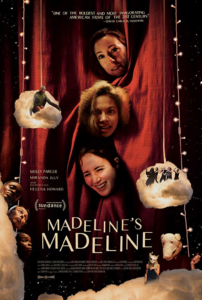Odd in an accessible way, with “Madeline’s Madeline” director Josephine Decker introduces the world to potentially the next big thing: Helena Howard.
 In “Madeline’s Madeline,” Regina warns Madeline to be careful, because she’s not like everyone else. The surly Madeline responds with something like “why, because I’m black.” Madeline is indeed different, and her mother Regina’s warning has little to do with the color of her skin.
In “Madeline’s Madeline,” Regina warns Madeline to be careful, because she’s not like everyone else. The surly Madeline responds with something like “why, because I’m black.” Madeline is indeed different, and her mother Regina’s warning has little to do with the color of her skin.
A precocious 16-year-old, Madeline (newcomer Helena Howard) relates to the world with an tilted sense of curiosity. Perhaps she’s suffering from a bi-polar disorder, that catch-all diagnosis made by armchair psychologists lacking the requisite level of education and turning to Google for explanations. Or maybe, Madeline is just a unique and creative being, driven by zeal and lust for finding  answers through provocation. At least, in her world, she has people who love and care about her, otherwise, she could easily be torn up by the wolves.
answers through provocation. At least, in her world, she has people who love and care about her, otherwise, she could easily be torn up by the wolves.
As a way to channel Madeline’s particular talents, her mother turns to an experimental, physical theater company led by the passionate Evangeline (Molly Parker). I wasn’t immediately familiar with what this kind of theater company was exactly, so, naturally, I Googled it. These companies tell stories through physical movement, including dance and mime. And in “Madeline’s Madeline” a lot of time is spend on exercises in which the theater members move in all sorts of strange ways, making noises that, I imagine, feel appropriate to the movement.

It’s really interesting and even a bit infectious to see these attractive bodies twisting and turning and moaning. And it makes sense that a 16-year-old, struggling with her own sexual awakening, might interpret, rightly or wrongly, these exercises as a type of sexual expression. Or maybe Madeline has it all figured out and is just trying to push the envelop. Provocation is Madeline’s weapon of choice, which frustrates her doting and protective mother. As Madeline floats in and out of a fantasy world promoted by the theater company exercises, Regina grows ever more concerned about her daughter’s mental health.
Director Josephine Decker works from a script written by herself and four others. Clearly, parts of this film are improvised, similar to the exercises of a physical theater company. This makes the narrative a little unfocused and meandering, which isn’t a bad thing. The natural flow is consistently interesting, as we wonder whether Madeline is a follower or a leader.

In one finely cut sequence, Helena Howard, making her screen debut, delivers an impressive monologue that is a show-stopper. Viewers, perhaps put off by the character’s erratic personality, might, in that moment, connect with this little girl personally more than any other performance this year. It’s very good work, and one wonders whether it would have been possible from an actor with a large number of roles under her belt. Howard strikes me as an actress that has yet to be infected with the cynicism of the industry.
And as her muses are three talented women, who, no doubt assisted her in crafting Madeline. Decker, a filmmaker I’m just now learning about, appears to have adopted a collaborative approach with her cast. Director and actress Miranda July plays Regina as a mother just trying to understand her daughter and not fray apart in the process. Equally perplexed by Madeline is theater leader Evangeline, played by the always great Molly Parker. With that team, how could Howard have delivered a bad performance?

But such a naive question misses the point. Surrounded by such talent, Howard’s deficiencies would likely have been immediately noticeable. And Howard more than holds her own, as the camera is continuously trained on her in medium and extreme close-ups, with the use of a shift-tilt lens to accentuate Madeline’s point of view. Had Howard not been up to it, Decker’s entire film would have been off, an abject failed experiment.
An exercise in something that could playfully be called physical cinema, “Madeline’s Madeline” showcases the rich fruits of collaborative filmmaking.
